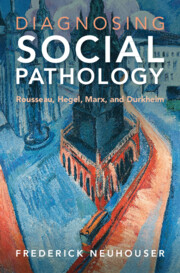Book contents
- Diagnosing Social Pathology
- Diagnosing Social Pathology
- Copyright page
- Dedication
- Contents
- Preface
- Note on Citations
- Chapter 1 Can Societies Be Ill?
- Chapter 2 Society as Organism?
- Chapter 3 Marx: Pathologies of Capitalist Society
- Chapter 4 Marx: Labor in Spiritual Life and Social Pathology
- Chapter 5 Plato: Human Society as Organism
- Chapter 6 Rousseau: Human Society as Artificial
- Chapter 7 Durkheim’s Predecessors: Comte and Spencer
- Chapter 8 Durkheim: Functionalism
- Chapter 9 Durkheim: Solidarity, Moral Facts, and Social Pathology
- Chapter 10 Durkheim: A Science of Morality
- Chapter 11 Hegelian Social Ontology I: Objective Spirit
- Chapter 12 Hegelian Social Ontology II: The Living Good
- Chapter 13 Hegelian Social Pathology
- Chapter 14 Conclusion: On Social Ontology
- Bibliography
- Index
Chapter 8 - Durkheim: Functionalism
Published online by Cambridge University Press: 07 October 2022
- Diagnosing Social Pathology
- Diagnosing Social Pathology
- Copyright page
- Dedication
- Contents
- Preface
- Note on Citations
- Chapter 1 Can Societies Be Ill?
- Chapter 2 Society as Organism?
- Chapter 3 Marx: Pathologies of Capitalist Society
- Chapter 4 Marx: Labor in Spiritual Life and Social Pathology
- Chapter 5 Plato: Human Society as Organism
- Chapter 6 Rousseau: Human Society as Artificial
- Chapter 7 Durkheim’s Predecessors: Comte and Spencer
- Chapter 8 Durkheim: Functionalism
- Chapter 9 Durkheim: Solidarity, Moral Facts, and Social Pathology
- Chapter 10 Durkheim: A Science of Morality
- Chapter 11 Hegelian Social Ontology I: Objective Spirit
- Chapter 12 Hegelian Social Ontology II: The Living Good
- Chapter 13 Hegelian Social Pathology
- Chapter 14 Conclusion: On Social Ontology
- Bibliography
- Index
Summary
Chapter 8 examines and partially defends Durkheim's functionalism as practiced in The Division of Labor in Society. His position is reconstructed with an eye to determining which aspects are worth retaining for a contemporary theory of social pathology, including the functionally organized nature of society. Focusing on claims regarding the moral function of the division of labor, it examines epistemological issues bound up with ascribing functions to features of society, including the relation between functional explanation and functional analysis and the role played by historical narratives. Durkheim's method is a complex holism whose claims depend less on single facts and individual arguments than on the plausibility of the whole picture that emerges from mutually reinforcing arguments, empirical facts, interpretive suggestions, and analogies. Thus, Durkheim's method for ascribing functions to social phenomena bears similarities to other interpretive enterprises, from the reading of texts to the construction of theories in the natural sciences.
Keywords
- Type
- Chapter
- Information
- Diagnosing Social PathologyRousseau, Hegel, Marx, and Durkheim, pp. 156 - 191Publisher: Cambridge University PressPrint publication year: 2022

